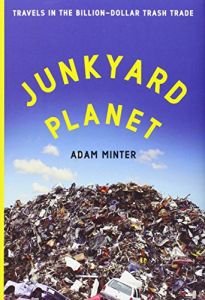Join getAbstract to access the summary!

Join getAbstract to access the summary!
Adam Minter
Junkyard Planet
Travels in the Billion-Dollar Trash Trade
Bloomsbury Press, 2013
What's inside?
This eye-opening investigation into the global-waste industry tells the truth behind the recycling hype.
Recommendation
Adam Minter, a Shanghai-based journalist and son of a scrapyard owner, tours the world’s waste “grubbing” hot spots to provide a savvy view of the processes, triumphs and failures of the scrap industry. He focuses mainly on recycling metals, but also covers plastics and the contentious topic of “e-waste.” His research highlights the importance of profit in the chain of waste-management and recycling. Some of the worst health and environmental side-effects relate directly to recycling cheap plastics, a business with minuscule margins. In contrast, profitable metal recycling is a worldwide “green success.” getAbstract recommends this ecological travelogue to those seeking to understand the global impact – and opportunities – of booming consumption and the resulting disposal of products. The recycling picture is more complex than you might think, given the mix of materials, motives and morals involved.
Summary
About the Author
Southeast Asia-based journalist Adam Minter writes for Bloomberg View and for recycling-oriented publications such as Scrap and Recycling International.

















Comment on this summary